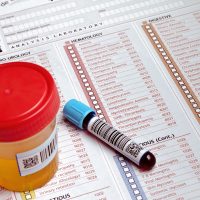Can You Drug Test the Opposing Party in a Divorce?

Ideally, when you divorce with kids, you and your ex can agree to a child custody arrangement based on your respective needs and the best interests of your children. Unfortunately, real life is rarely so simple. Even parties to an amicable divorce can disagree over custody schedules and parenting time. If you believe your ex poses a danger to your children because of a substance abuse problem, criminal activity, or other concerns, matters can quickly become as complex as they are grave.
Under certain circumstances, you may be able to affect the custody outcome by proving that your child’s other parent does pose such a danger, including by way of a drug test. Read on to learn about drug tests and divorce, and contact Union family law attorney John B. D’Alessandro for help with divorce, child custody, or other matters involving children in New Jersey family courts.
Requesting a Drug Test in a New Jersey Divorce
When children are involved in a divorce, the court’s primary custody concern is for the well-being of the children. The court will entertain arguments and evidence to determine what custody and visitation arrangement serves the best interests of the children. Allegations that go directly to the health and safety of the children are taken very seriously.
If you believe your spouse has a substance abuse problem, your divorce attorney can petition the court to order a drug test. The drug test may analyze the party’s hair, urine, or blood for the presence of illicit substances, depending upon the court’s preferences and practices.
The court will only order a drug test if they believe there is sufficient evidence of a drug or alcohol problem that could impact the best interests of the children. It’s not enough for there to be an accusation of drug use; the court needs proof. The court will hold a hearing, at which both parties can present evidence and even witness testimony concerning the need for a drug test.
You and your attorney may present evidence demonstrating that your spouse has a drug problem, such as:
- Medical records showing drug abuse, overdoses, child endangerment, etc.
- Criminal records concerning drug arrests or convictions, violent incidents, domestic violence, etc.
- Testimony or statements from teachers, family members, or other parties with knowledge of your spouse’s drug or alcohol abuse
- Emails, text messages, voicemails, social media posts, photographs, and other evidence directly or indirectly proving drug use and/or a drug abuse problem
What Do the Results of a Drug Test Mean for My Divorce?
If the drug test comes back positive, the court will take that into account when making a decision regarding child custody. The precise effect of a positive test depends upon the nature of the test and the drugs involved. A hair follicle test showing some marijuana usage over the past several months will not carry as much weight as a blood test showing meth or heroin usage in the past week, or a breath test showing current intoxication.
Even if the test shows illicit drug use, the court might not wish to automatically grant you sole custody. The court may order the party who failed the test to undergo drug or alcohol counseling or to enter a drug treatment facility. If they successfully comply with the program and pass future drug tests, the court could take that adjustment into account. Courts prefer to keep both parents in their child’s life wherever possible. If their addiction is serious, however, and puts the child at risk, the court might strip them of some or all custody rights, limiting them to visitation, supervised visitation, or no contact.
If your spouse passes the drug test, they will use that as evidence in their favor. They might even try to argue your allegations were unsupported and vindictive. At the least, the court may take future accusations of drug or alcohol abuse with a significant grain of salt; it’ll be very tough to get the court to agree to another drug test down the line.
It’s important to discuss the pros and cons of requesting a drug test with your divorce attorney and to make sure your allegations are supported by proper evidence.
Call a Seasoned New Jersey Family Law Attorney for Trusted Advice and Representation
If you’re considering divorce, or if you’re dealing with issues involving parental rights, child custody, child support, or other family law matters in New Jersey, contact the zealous and successful Union family law attorney John B. D’Alessandro for a consultation.